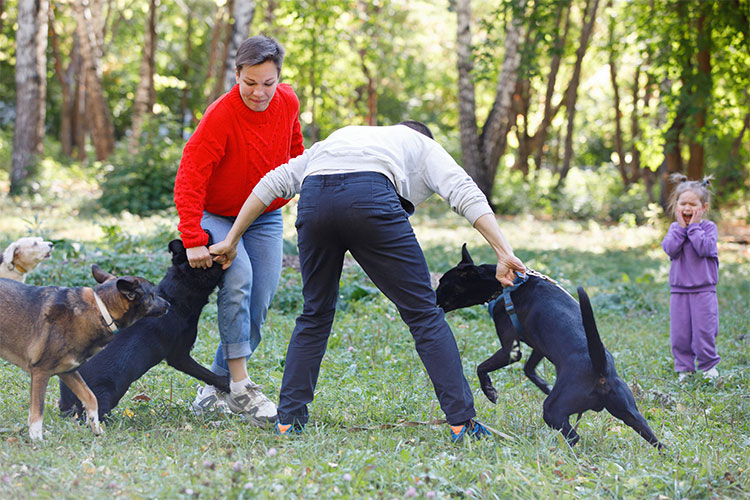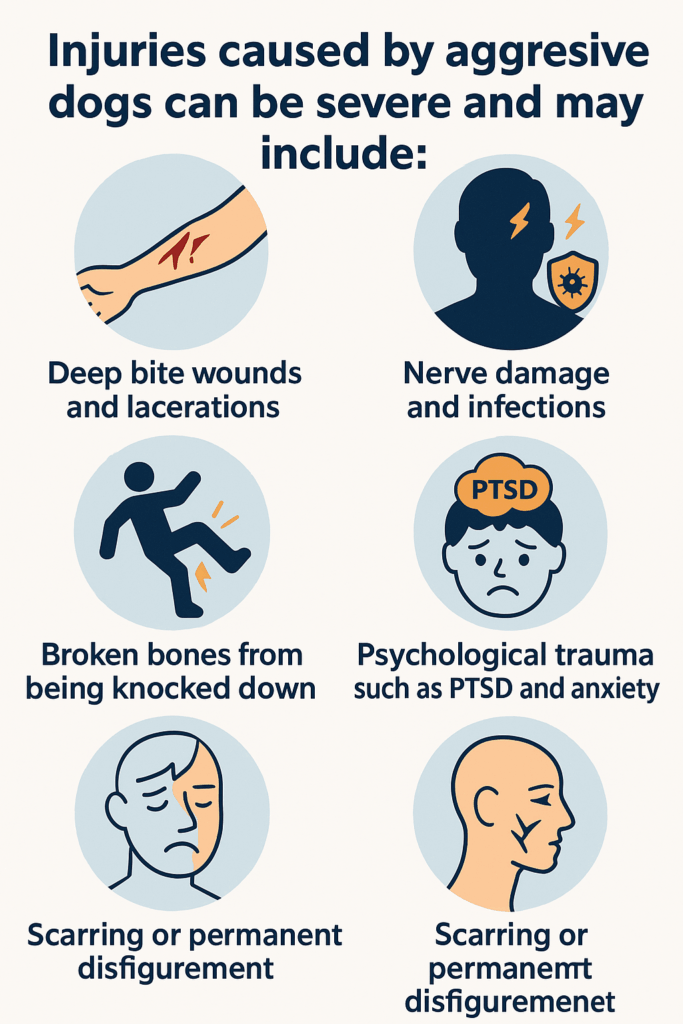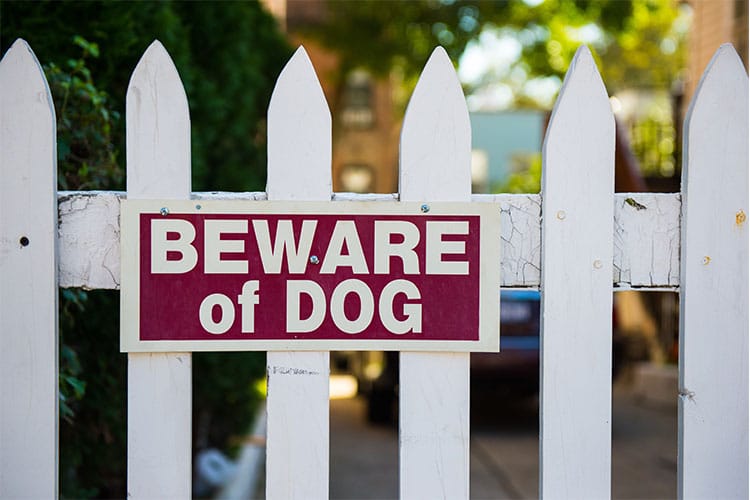
Injuries caused by aggressive dogs can be severe and may include:
Injuries caused by aggressive dogs can range from deep bite wounds and infections to lasting psychological trauma. Victims often need medical care, therapy, and time off work. If you or your child suffered injuries caused by aggressive dogs, Georgia law allows you to pursue compensation.
According to the CDC, dog bites send thousands to emergency rooms each year, making it essential to seek prompt treatment and legal guidance. After an attack, document the scene, save medical records, and speak with a dog-injury attorney to protect your rights.
A dog attack is frightening and can leave lasting scars—physical and emotional. Families may face medical bills, missed income, and anxiety, while owners confront questions about responsibility, insurance, and compliance with local rules.
In Georgia, state law sets clear standards for when an owner or custodian may be held liable, and local leash or “at heel” ordinances can strengthen a claim when restraints are ignored. This guide explains what the law says, how to prove fault, and what damages you may recover.

If you were bitten by a dog in Georgia, here’s a simple rundown of when you can hold the owner accountable. If you are a dog owner, you may take this as a list of circumstances under which you may be held responsible:
Georgia’s main dog-injury law, O.C.G.A. § 51-2-7, lets a victim seek compensation when:
Put simply, if an owner or keeper failed to act with reasonable care and their dog injured someone, the injured person may have grounds for a case.
Many Georgia cities and counties require dogs to be on a leash or “at heel.” If the dog that bit was supposed to be restrained under a local ordinance and was not, that can help prove the dog had a “vicious propensity.”
For victims, you still need to show the bite caused your medical bills, lost wages, pain, and other damages, but the leash violation strengthens your case.
Many shoppers and pedestrians suffer injuries caused by aggressive dogs when owners fail to restrain them properly. These attacks may involve broken bones, nerve damage, or lasting scars. Under Georgia law, leash violations can strengthen liability claims for injuries caused by aggressive dogs. Resources from ASPCA
explain how leash laws and “at heel” rules can prove negligence and increase your chance of recovery.
The injured party may be able to prove that an owner or a keeper carelessly managed their dog by proving that they have been:
The legal standard is ordinary care under the circumstances. The more preventable the situation, the stronger the argument.
No. Georgia does not use the traditional “one-bite rule” that some states follow. In a one-bite state, an owner may only be held liable if their dog has already bitten once before, or if they knew the dog had dangerous tendencies. Georgia takes a different approach. Under O.C.G.A. § 51-2-7, liability can arise if the dog was carelessly managed, allowed to roam, or if local leash ordinances were ignored.
This means a victim does not need to prove the dog had bitten someone before. Instead, the focus is on whether the owner or keeper acted with reasonable care and followed the law.
Liability for a dog bite depends on who had the ability to manage or restrain the animal. The law focuses on control, not just ownership of the property where the bite occurred. In most cases, responsibility falls on the following parties:
However, the victim must be able to show that they did not provoke the dog before it bit or attacked them. And even with a leash law violation, they still need to connect the owner’s careless handling to their injury and provide documentation of the damages involved.
Knowing the law is one thing, but winning a dog bite claim depends on the evidence you can bring forward. Courts and insurers look for proof that ties the dog owner’s conduct directly to the attack and the resulting injuries.
To establish fault, the case usually needs to show several key points:
The strength of the claim comes from tying these elements together with evidence. Medical records, photos of the injuries, witness testimony, prior complaints about the dog, and even animal control reports can all be vital in showing that the attack was preventable and that the owner or keeper should be held accountable.
When a dog attack leaves someone injured, the law recognizes more than just the immediate physical harm. One can pursue damages that reflect the full impact the incident has had on their life. These typically include both financial costs and personal losses, specifically:
Injuries caused by aggressive dogs leave more than just physical wounds — victims often face PTSD, fear, and long-term stress. Families dealing with injuries caused by aggressive dogs deserve compensation for medical bills, lost wages, and emotional harm. Studies from the National Safety Council highlight how aggressive animal incidents impact entire households, making timely legal support essential for recovery.

If your pet is attacked by another dog, you may have the right to recover costs from the other dog’s owner. Many of the same rules that apply to human injury claims also apply when a dog injures another dog.
The most common recovery is for vet bills. This includes emergency visits, surgery, medication, and follow-up treatment. If your dog’s injuries require long-term or ongoing care, those costs may also be part of the claim.
Expenses tied to the attack may also be recoverable. Examples include boarding during recovery, travel to specialists, or replacing damaged equipment such as a harness, crate, or mobility aid.
If the other dog was loose, aggressive, or off-leash in violation of local rules, its owner may be held legally responsible for the harm caused.
Proof is critical in these cases. Helpful evidence includes veterinary records, photos of your dog’s injuries, receipts for treatment, witness statements, and any proof of local leash violations. Collecting this evidence early strengthens your claim.
A claim may be based on either negligence (careless handling of the dog) or an ordinance breach (breaking leash or restraint laws). In both cases, the law provides a way to hold the other owner accountable and recover your losses.
Even the strongest case can fall apart if it’s filed too late. In Georgia, most dog-injury claims fall under the general two-year statute of limitations for personal injury. This means you usually have two years from the date of the attack to file your lawsuit in court.
If the claim involves a public entity, like a city or county, that may have failed to restrain or manage a dog in its custody, the deadlines are much shorter. Ante litem notices (formal written notices of your intent to sue) may need to be filed within six months for city claims or one year for county or state claims.
Missing these early deadlines can bar you from recovery entirely.
Most dog-bite cases in Georgia do not end up in front of a jury. Instead, insurance companies often prefer to settle when there is clear proof of negligence, since trials take time and can be unpredictable.
That said, whether your case settles or goes to trial depends on several factors:
In short, settlement is the norm, but your attorney will prepare your case as if it’s going to trial so you’re ready for either outcome.
Dog attacks leave victims with medical bills, stress, and difficult questions about responsibility. Georgia law gives you the ability to seek recovery when an owner fails to control their dog.
Thompson Law has handled many dog bite and attack cases and knows what it takes to hold owners accountable. Our team can review your situation, explain your legal options, and build a strong case for compensation.
Contact Thompson Law today for a FREE CONSULTATION to discuss your situation and get the answers you need.

Any bite or attack that causes physical harm (puncture wounds, lacerations, infection, nerve damage) or psychological trauma can be considered injuries caused by aggressive dogs, especially when the dog was off-leash, poorly restrained, or known to lunge, snap, or charge.
The dog’s owner or handler is typically liable when they fail to use reasonable care, violate local leash rules, or allow the dog to roam. In some cases, a property owner or custodian who controlled the animal may also share responsibility.
Medical records, photos of wounds, torn clothing, witness statements, prior complaints about the dog, animal-control reports, and proof of leash-law violations. Save bills and receipts to document losses like treatment costs and missed work.
Settlements vary based on injury severity, scarring, infection risk, lost income, medical care, and long-term effects. Damages may include medical expenses, wage loss, pain and suffering, counseling, and scar revision when appropriate.
Deadlines depend on your state’s statute of limitations. Act quickly so evidence is preserved and your attorney can meet any notice requirements for claims involving public entities.
Not before you understand your rights. Provide basic facts only. Avoid recorded statements and signing releases until you consult a dog-injury lawyer who can protect your claim.
Sí. Hablamos español. Ofrecemos asistencia bilingüe para que tenga acceso completo a nuestros abogados.
Next step: If you or a loved one suffered injuries caused by aggressive dogs, request a FREE consultation. We can evaluate liability, estimate case value, and start preserving time-sensitive evidence today.
Contact Thompson Law today for a FREE CONSULTATION






Thompson Law charges NO FEE unless we obtain a settlement for your case. We’ve put over $1.9 billion in cash settlements in our clients’ pockets. Contact us today for a free, no-obligation consultation to discuss your accident, get your questions answered, and understand your legal options.
State law limits the time you have to file a claim after an injury accident, so call today.